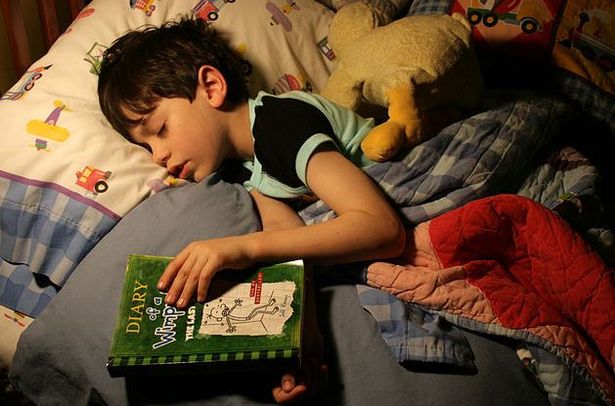Sharp rise in number of children admitted to hospital with sleep problems
The disorders include sleep apnea, insomnia and narcolepsy, as well as nightmares and sleepwalking
BY CLAIRE MILLER & EMMA GILL | 3 FEB 2017 | ManchesterEveningNews.co.uk
 The number of Manchester children admitted to hospital with sleeping problems has risen by a tenth in a year.
The number of Manchester children admitted to hospital with sleeping problems has risen by a tenth in a year.
Figures from NHS Digital show the number of hospital admissions with a primary diagnosis of sleeping disorders, which covers problems like sleep apnea, insomnia and narcolepsy, as well as nightmares and sleepwalking.
There were at least 373 admissions in 2015/16 of children aged 18 and under with a primary diagnosis of sleeping disorders from the Central Manchester Clinical Commissioning Group, up 10 per cent from around 340 admissions in 2014/15.
Children under four were the most likely to be admitted, with 212 admissions in 2015/16, up from 189 in 2014/15, with admissions for children aged five to nine up from 95 to 124.
Mum-of-two Kath Paddison’s youngest son Ewan, five, was diagnosed with mild sleep apnea after they sought help when he was frequently waking in the night.
The 39-year-old, from Cheadle, said: “I realised quite early on that he mainly breathes through his mouth rather than his nose and we eventually discovered that’s what is waking him at night – as he stops breathing for a short time.
“It’s not severe enough for the hospital to do anything about it so we’ve just got to hope that it will improve as he gets older and bigger.”
Across Greater Manchester, there were at least 618 admissions for sleeping disorders in 2015/16, up 13% from around 546 in 2014/15.
In north Manchester the number of admissions rose from 78 to 87, while numbers were up from 107 to 114 in south Manchester.
Sleep specialist and maternity nanny Abi Thompson helps sleep-deprived parents by working with them to create packages tailored to each family and child through her Baby Sound Asleep business.
She said: “Sleep disorders are a medical condition which need treating by a doctor. I believe the rise in reported sleep disorders is largely due to an acceptance that this is a real condition that requires medical treatment so it is OK to seek help.
“For more general disturbed nights and lack of sleep, often formed by habit, parents can become almost desperate to seek a solution or a reason why their baby has such a disturbed sleep pattern.
“In these cases at Baby Sound Asleep I offer routines, techniques and most importantly support which can be put in place to help.
“Whether your child is suffering from a sleep disorder or disturbed sleep potentially due to habit, there is help available. Sleep is essential to the whole family for healthy brain development.”
The Children’s Sleep Charity offers workshops, clinics and written materials to support families who are struggling to get a good night’s sleep.
It is hosting a free Sleep Success Workshop in Manchester on Monday which anyone can attend.
The workshop focuses on ‘understanding sleep cycles, common sleep issues and strategies to manage these’.
Charity CEO Vicki Dawson said: “It is important that parents seek appropriate help for their child’s sleep issues.
“Sleep difficulties in children are common with up to 40 per cent of children experiencing a sleep issue at some point in childhood.
“Attending a workshop can help parents to reduce feelings of isolation providing them with an opportunity to meet others in the similar situations.
“The accredited workshops are run by qualified and experienced Sleep Practitioners who work supportively with families to empower them to make the changes that they want to make to encourage children to get a better night’s sleep.”
Monday’s workshop runs from 9.30am until 2.30pm at St Thomas Centre, Ardwick Green North, Manchester, M12 6FZ.
For more details or to book email info@thechildrenssleepcharity.org.uk.
 Dr Bernadka Dubicka, chair-elect of faculty of the child and adolescent psychiatry at the Royal College of Psychiatrists, says the figures are ‘concerning but not surprising’.
Dr Bernadka Dubicka, chair-elect of faculty of the child and adolescent psychiatry at the Royal College of Psychiatrists, says the figures are ‘concerning but not surprising’.
She said: “Sleep problems are on the rise in children and adolescents and up to one in four have sleep difficulties.
“There are different types of sleep disorders but we know that child and adolescents are getting less and less sleep nowadays.”
Dr Dubicka, honorary reader in child psychiatry at the University of Manchester, added: “This can have a profound effect and lead to emotional and behavioural problems, as well as difficulties at school and tensions at home.
“The role of parents is crucial in helping their children to establish sleep routines, setting limits on screen time, and keeping bedrooms as quiet, low stimulus spaces.”
Here Abi offers her top tips for getting a baby or young child to sleep through the night – something she declares is ‘more of an art than a science’.




